Ford Explorer EV vs Jaguar E-Pace – Which one offers the better deal?
Both models have their strengths – but which one suits you more?
Compare performance, efficiency, price and space directly: Ford Explorer EV or Jaguar E-Pace?
Costs and Efficiency:
When it comes to price and running costs, the biggest differences usually appear. This is often where you see which car fits your budget better in the long run.
Jaguar E-Pace has a slight advantage in terms of price – it starts at 32400 £, while the Ford Explorer EV costs 34200 £. That’s a price difference of around 1800 £.
As for range, the Ford Explorer EV performs significantly better – achieving up to 602 km, about 533 km more than the Jaguar E-Pace.
Engine and Performance:
Power, torque and acceleration say a lot about how a car feels on the road. This is where you see which model delivers more driving dynamics.
When it comes to engine power, the Ford Explorer EV has a clearly perceptible edge – offering 340 HP compared to 269 HP. That’s roughly 71 HP more horsepower.
In acceleration from 0 to 100 km/h, the Ford Explorer EV is noticeable quicker – completing the sprint in 5.30 s, while the Jaguar E-Pace takes 7.30 s. That’s about 2 s faster.
In terms of top speed, the Jaguar E-Pace performs a bit better – reaching 211 km/h, while the Ford Explorer EV tops out at 180 km/h. The difference is around 31 km/h.
There’s also a difference in torque: Ford Explorer EV pulls clearly perceptible stronger with 679 Nm compared to 540 Nm. That’s about 139 Nm difference.
Space and Everyday Use:
Whether family car or daily driver – which one offers more room, flexibility and comfort?
Both vehicles offer seating for 5 people.
In curb weight, Jaguar E-Pace is minimal lighter – 1783 kg compared to 1908 kg. The difference is around 125 kg.
In terms of boot space, the Jaguar E-Pace offers barely noticeable more room – 494 L compared to 450 L. That’s a difference of about 44 L.
In maximum load capacity, the Ford Explorer EV performs slightly better – up to 1422 L, which is about 252 L more than the Jaguar E-Pace.
When it comes to payload, Ford Explorer EV hardly perceptible takes the win – 585 kg compared to 554 kg. That’s a difference of about 31 kg.
Who comes out on top?
Overall, the Ford Explorer EV shows itself to be outperforms in nearly all aspects and secures the title of DriveDuel Champion.
It convinces with the more balanced overall package and proves to be the more versatile choice for everyday use.
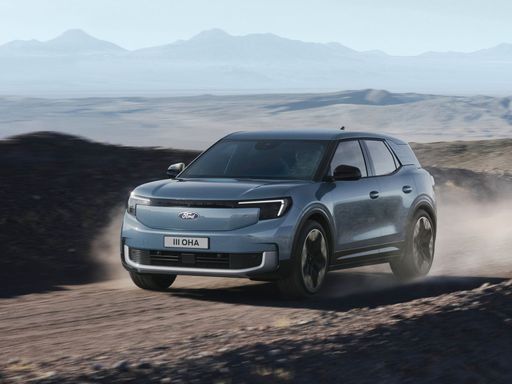
Ford Explorer EV
Ford Explorer EV
The Ford Explorer EV marks a significant step forward in the brand's journey towards electrification, offering an impressive blend of performance and sustainability. This modern SUV features a sleek design complemented by advanced technology that enhances the driving experience. With a focus on comfort and innovation, the Explorer EV aims to redefine family travel for the electric age.
details @ electricexplorer.fordpresskits.com
@ electricexplorer.fordpresskits.com
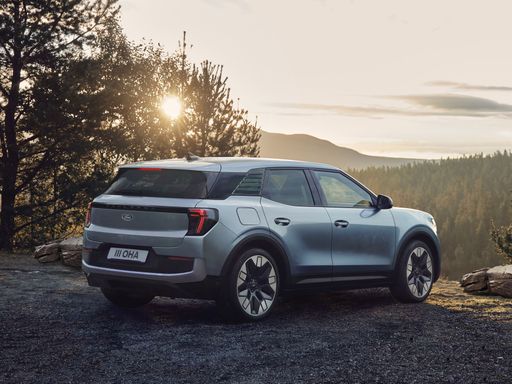 @ electricexplorer.fordpresskits.com
@ electricexplorer.fordpresskits.com
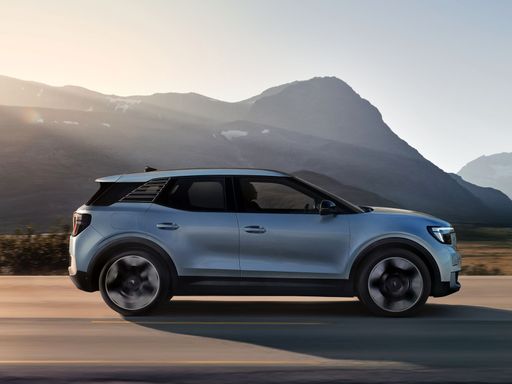 @ electricexplorer.fordpresskits.com
@ electricexplorer.fordpresskits.com
Jaguar E-Pace
The Jaguar E-Pace is a compact SUV that combines the brand's signature luxury with a dynamic driving experience. Its sleek design features graceful lines and an assertive stance, making it a standout on any road. Inside, the E-Pace boasts a meticulously crafted interior with high-quality materials and advanced technology, providing both comfort and connectivity for drivers and passengers alike.
details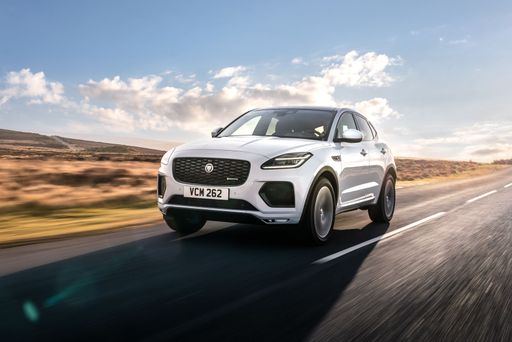 @ media.jaguar.com
@ media.jaguar.com
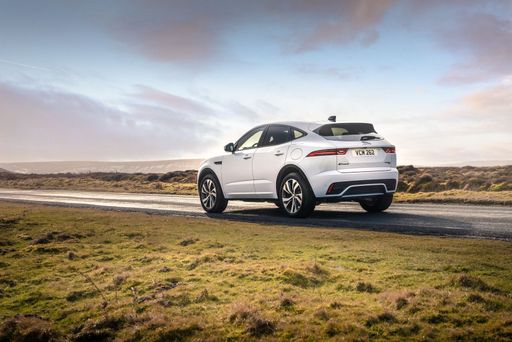 @ media.jaguar.com
@ media.jaguar.com
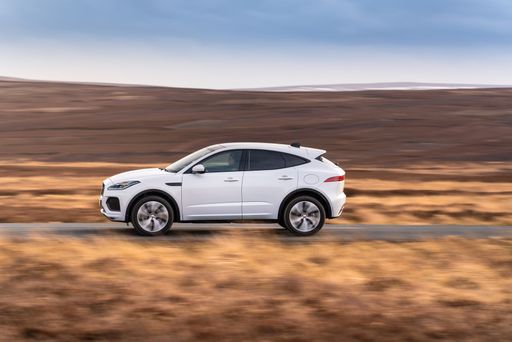 @ media.jaguar.com
@ media.jaguar.com
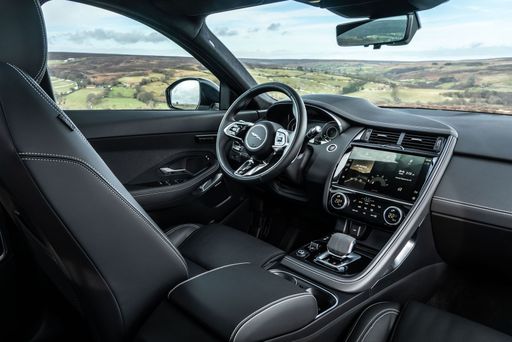 @ media.jaguar.com
@ media.jaguar.com
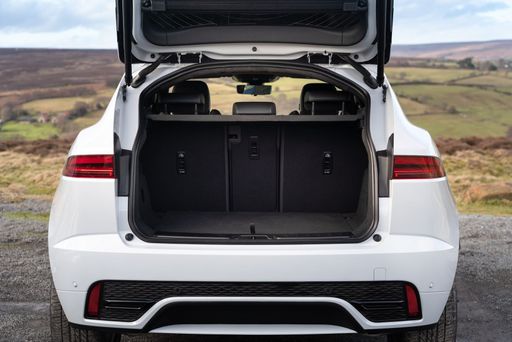 @ media.jaguar.com
@ media.jaguar.com

|

|
|
|
|
Costs and Consumption |
|
|---|---|
|
Price
34200 - 48800 £
|
Price
32400 - 56100 £
|
|
Consumption L/100km
-
|
Consumption L/100km
1.4 - 8.2 L
|
|
Consumption kWh/100km
14.5 - 17.2 kWh
|
Consumption kWh/100km
-
|
|
Electric Range
360 - 602 km
|
Electric Range
69 km
|
|
Battery Capacity
52 - 79 kWh
|
Battery Capacity
11.50 kWh
|
|
co2
0 g/km
|
co2
33 - 185 g/km
|
|
Fuel tank capacity
-
|
Fuel tank capacity
56 - 67 L
|
Dimensions and Body |
|
|---|---|
|
Body Type
SUV
|
Body Type
SUV
|
|
Seats
5
|
Seats
5
|
|
Doors
5
|
Doors
5
|
|
Curb weight
1908 - 2179 kg
|
Curb weight
1783 - 2173 kg
|
|
Trunk capacity
445 - 450 L
|
Trunk capacity
494 L
|
|
Length
4468 mm
|
Length
4395 mm
|
|
Width
1871 mm
|
Width
1984 mm
|
|
Height
1630 - 1639 mm
|
Height
1648 mm
|
|
Max trunk capacity
1417 - 1422 L
|
Max trunk capacity
1170 L
|
|
Payload
561 - 585 kg
|
Payload
497 - 554 kg
|
Engine and Performance |
|
|---|---|
|
Engine Type
Electric
|
Engine Type
Plugin Hybrid, Diesel MHEV, Petrol MHEV
|
|
Transmission
Automatic
|
Transmission
Automatic
|
|
Transmission Detail
Reduction Gearbox
|
Transmission Detail
Automatic Gearbox
|
|
Drive Type
Rear-Wheel Drive, All-Wheel Drive
|
Drive Type
All-Wheel Drive, Front-Wheel Drive
|
|
Power HP
170 - 340 HP
|
Power HP
160 - 269 HP
|
|
Acceleration 0-100km/h
5.3 - 8.7 s
|
Acceleration 0-100km/h
7.3 - 10.5 s
|
|
Max Speed
160 - 180 km/h
|
Max Speed
190 - 211 km/h
|
|
Torque
310 - 679 Nm
|
Torque
260 - 540 Nm
|
|
Number of Cylinders
-
|
Number of Cylinders
3 - 4
|
|
Power kW
125 - 250 kW
|
Power kW
118 - 198 kW
|
|
Engine capacity
-
|
Engine capacity
1498 - 1998 cm3
|
General |
|
|---|---|
|
Model Year
2024 - 2025
|
Model Year
2024
|
|
CO2 Efficiency Class
A
|
CO2 Efficiency Class
B, G
|
|
Brand
Ford
|
Brand
Jaguar
|
What drive types are available for the Ford Explorer EV?
The Ford Explorer EV is available as Rear-Wheel Drive or All-Wheel Drive.
The prices and data displayed are estimates based on German list prices and may vary by country. This information is not legally binding.
